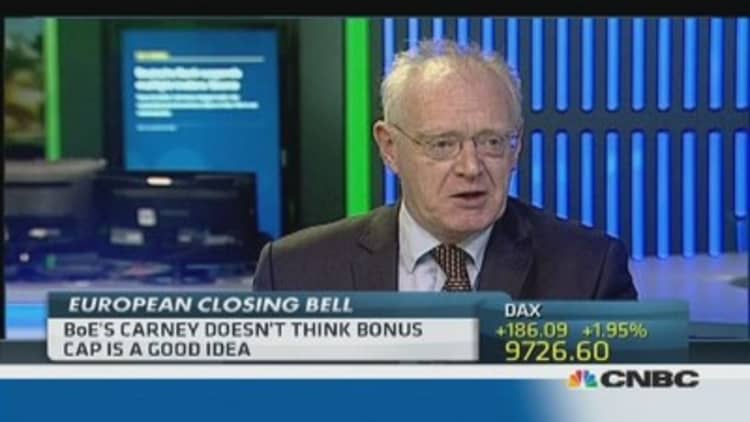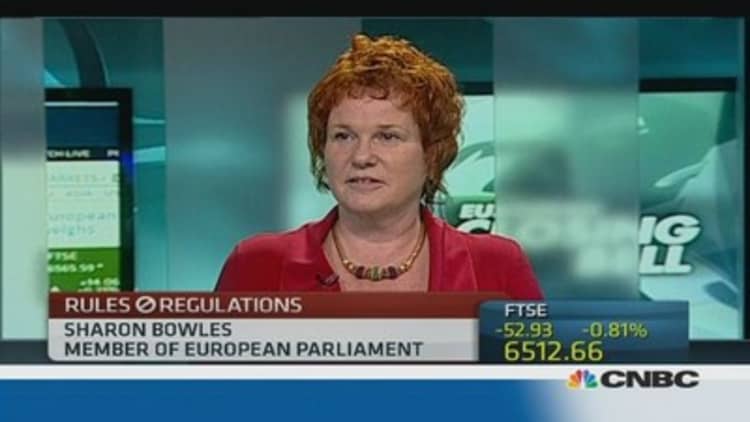
Cash bonuses at the Royal Bank of Scotland (RBS) will be limited to £2,000 ($3,284) next year, Britain's Prime Minister David Cameron told Parliament on Tuesday.
Cameron also said he would reject any plans by the 81 percent taxpayer-owned bank to hike its overall pay and bonus bill.
The move comes after the opposition Labour Party put pressure on the government to block any attempt by RBS to pay its bankers bonuses of more than twice their annual salary.
The bank is reportedly planning to use a European Union (EU) rule allowing it to pay out bonuses of twice an employee's salary, providing the move is approved by shareholders.
(Read more: RBS's finance chief Bostock quits to join Santander UK)
An RBS spokesperson told CNBC that general discussions about bonuses were taking place with shareholders and U.K. Financial Investments -- the body in charge of managing the government's stakes in bailed-out banks.
"No decisions have been taken; we are consulting with our shareholders in the normal way," RBS said in a emailed statement.
Labour tabled a motion in Parliament on Wednesday urging the government to use its majority stake in the bank to reject a request to raise the bonus cap, and opposition leader Ed Miliband raised the topic in the weekly Prime Minister's Questions.
"At a time when families face a cost-of-living crisis and bank lending to business is falling, it cannot be right for George Osborne to approve a doubling of the bank bonus cap," Chris Leslie, Labour's shadow chief secretary to the Treasury, said in a statement.
"It shouldn't have taken the EU to act to rein in excessive bonuses, but there has been no action from the Chancellor here in Britain. As the majority shareholder, the Government should reject any request from RBS to increase the cap."
(Read more: New RBS boss McEwan tasked with restoring bank to health)
Contentious issue
Bankers' bonuses have been in the spotlight since the start of the financial crisis, and have remained contentious amid political wrangling between the EU and Britain over the issue.
The U.K. Treasury launched a legal challenge against the EU rules on bankers' bonuses, fearing it would result in a rise in basic salaries, hamper business and push top talent out of the industry.
While paying bankers large bonuses for short-term performances is a "recipe for disaster", according to Andre Spicer, professor of organisational behaviour at Cass Business School in London, the changes to remuneration could bring "unintended consequences."
"Declining bonuses could also push some bankers who favor quick rewards for risky behaviour into the shadow banking system. This might create problems at the murky margins of the market which regulators have difficulty penetrating," he said in a note on Wednesday.
(Read more: RBS to cut 1,400 jobs as restructuring continues)

"The ongoing controversy over bonuses is likely to further alienate many senior bankers - who already feel like they have been waiting a few years to be paid for their work."
RBS CEO Ross McEwan is currently devising a cost-cutting strategy which is likely to lead to further job losses at the bank. It has already significantly downsized its investment bank operations.
During last year's bonus season, RBS revealed it had paid 95 bankers bonuses of £1 million or more. By comparison, litigation-hit bank Barclays paid 428 members of staff over £1 million.
—By CNBC's Arjun Kharpal: Follow him on Twitter @ArjunKharpal


